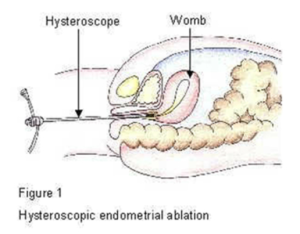Endometrial Ablation
What is an endometrial ablation?
An endometrial ablation is an operation to remove the lining of your uterus (womb).
What are the benefits of sungery?
Most women have a noticeable reduction in their periods and, for some women, periods stop altogether. An endometrial ablation has fewer complications and a quicker recovery time than a hysterectomy.
Are there any alternatives to surgery?
Heavy periods can be treated using a variety of oral medications, or an IUD (intra-uterine device).
What does the operation involve?
The operation is usually performed under a general anaesthetic. The operation usually takes about 30 minutes. Your gynaecologist will pass a hysteroscope (telescope) through your vagina, across your cervix into your womb. They will use electricity or laser energy to remove the lining of your womb.


What complications can happen?
General complications
- Pain
- Feeling or being sick
- Bleeding or discharge
- Infection
- Blood clots
Specific complications
- Bleeding during the operation
- Making a hole in your womb
- Failed procedure
- Haematometra
- Blood and fluid collecting in your fallopian tubes
- Continued bleeding or pain
How soon will I recover?
You should be able to go home the same day.
You should be able to return to normal activities after two to four days. Most women are fit for work after about a week.
You should expect to have some bleeding or discharge for up to four weeks.
Regular exercise should help you to return to normal activities as soon as possible. Before you start exercising, ask the healthcare team or your GP for advice.
The operation is not recommended for women who still want children. However, even if your periods stop, there is still a risk of becoming pregnant.

